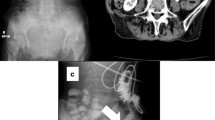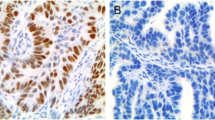Summary
p53 gene mutations play an important role in the pathogenesis of pancreatic carcinomas. Anti-p53 antibodies and p53 protein have been detected in the sera of patients with pancreatic carcinomas. However, very little is known about the clinical significance of these p53 antibodies. We investigated the relationship between anti-p53 antibodies and the presence of p53 protein in cancer cells and the serum, as well as other clinical factors. Anti-p53 antibodies were detected in 19 (23%) of 82 pancreatic-duct-cell carcinomas, and in one (5%) of 21 cases of chronic pancreatitis. However, no antibodies were detected in mucin-producing tumors or in islet-cell tumors of the pancreas. The anti-p53 antibodies were detected in both early and advanced stages. In those patients undergoing surgical resection for pancreatic duct-cell carcinomas, the prognosis of patients who were negative for the anti-p53 antibodies was better than patients who were positive. Of the 11 cases that were positive for anti-53 antibodies, 8 (73%) were also positive for the immunohistochemical expression of p53 protein in cancer cells. However, there was no significant correlation between the presence of anti-p53 antibodies and the serum p53 protein levels. These results suggest that the benefits of measuring the anti-p53 antibody titier as a screening test to detect pancreatic carcinoma are limited, but the presence of anti-p53 antibodies predicts a poor prognosis for post-operative pancreatic carcinoma patients.
Similar content being viewed by others
References
Levine AJ, Momand J, Finley CA. The p53 tumor suppresor gene. Nature 1991;351:453–456.
Vogelstein B, Kinzler KW. p53 function and dysfunction. Cell 1992;70:523–526.
Barton CM, Staddon SL, Hughes CM, et al. Abnormalities of the p53 tumour suppressor gene in human pancreatic cancer. Br J Cancer 1991;64:1076–1082.
Boschman CR, Stryker S, Reddy JK, et al. Expression of p53 protein in precursor lesions and adenocarcinoma of human pancreas. Am J Pathol 1994;145:1291–1295.
Berrozpe G, Schaeffer J, Peinado MA, et al. Comparative analysis of mutations in the p53 and K-ras genes in pancreatic cancer. Int J Cancer 1994;58:185–191.
Greenblatt MS, Bennett WP, Hollstein M, et al. Mutations in the p53 tumor suppressor gene: clues to cancer etiology and molecular pathogenesis. Cancer Res 1994;54;4855–4878.
Suwa H, Ohshio G, Okada N, et al. Clinical significance of serum p53 antigen in patients with pancreatic carcinomas. Gut 1997;40:647–653.
Crawford LV, Pim DC, Bulbrook RD. Detection of antibodies against the cellular protein p53 in sera from patients with breast cancer. Int J Cancer 1982;30:403–408.
Volkmann M, Müller M, Walter J, et al. The humoral immune response to p53 in patients with hepatocellular carcinoma is secific for malignancy and independent of the α-fetoprotein status. Hepatology 1993;18:559–565.
Angelopoulou K, Diamandis EP, Sutherland DJA, et al. Prevalence of serum antibodies against the p53 tumour suppressor gene protein in various cancers. Int J Cancer 1994;58:480–487.
Laurent-Puig P, Lubin R, Semhoun-Ducloux S, et al. Antibodies against p53 protein in serum of patients with benign or malignant pancreatic and biliary diseases. Gut 1995;36:455–458.
Mudenda B, Green JA, Green B, et al. The relationship between serum p53 autoantibodies and characteristics of human breast cancer. Br J Cancer 1994;69:1115–1119.
Gansauge S, Gansauge F, Negri G, et al. The role of anti-p53-autoantibodies in pancreatic disorders. Int J Pancreatol 1996;19:171–178.
Houbiers JGA, Burg SH, Watering LMG, et al. Antibodies against p53 are associated with poor prognosis of colorectal cancer. Br J Cancer 1995;72:637–641.
Peyrat JP, Bonneterre J, Lubin R, et al. Prognostic significance of circulating p53 antibodies in patients undergoing surgery for locoregional breast cancer. Lancet 1995;345:621–622.
Jais P, Vuagnat A, Terris B, et al. Association of serum antibodies against p53 protein with poor survival in patients with Zollinger-Ellison syndrome. Gastroenterology 1998;114:37–43.
Winter SF, Minna JD, Johnson BE, et al. Development of antibodies against p53 in lung cancer patients appears to be dependent on the type of p53 mutation. Cancer Res 1992;52:4168–4174.
Angelopoulou K, Stratis M, Diamandis EP. Humoral immune response against p53 protein in patients with colorectal carcinoma. Int J Cancer 1997;70:46–51.
Ohshio G, Manabe T, Watanabe Y, et al. Comparative studies of DU-PAN-2, Carcinoembryonic antigen, and CA19-9 in the serum and bile of patients with pancreatic and biliary tract diseases: Evaluation of the influence of obstructive jaundice. Am J Gastroenterol 1990;85:1370–1376.
Hammel P, Boissier B, Chaumette MT, et al. Detection and monitoring of serum p53 antibodies in patients with colorectal cancer. Gut 1997;40:356–361.
Lubin R, Schlichtholz B, Bengoufa D, et al. Analysis of p53 antibodies in patients with various cancers define B-cell epitopes of human p53-distribution on primary structure and exposure on protein surface. Cancer Res 1993;53:5872–5876.
Brevern MCV, Hollstein MC, Cawley HM, et al. Circulating anti-p53 antibodies in esophageal cancer patients are found predominantly in individuals with p53 core domain mutations in their tumors. Cancer Res 1996;56:4917–4921.
Schlichtholz B, legros Y, Gillet D, et al. The immune response to p53 in breast cancer patients is directed against immunodominant epitopes unrelated to the mutational hot spot. Cancer Res 1992;52:6380–6384.
Guinee Jr DG, Travis WD, Trivers GE, et al. Gender comparisons in human lung cancer: analysis of p53 mutations, anti-p53 serum antibodies, and C-erb B-2 expression. Carcinogenesis 1995;16:993–1002.
Yokoyama M, Yamanaka K, Friess H, et al. p53 expression in human gastric cancer correlates with enhanced biological aggresisveness. Anticancer Res 1994;14:2477–2484.
Author information
Authors and Affiliations
Rights and permissions
About this article
Cite this article
Ohshio, G., Suwa, H. & Imamura, M. Clinical implication of anti-p53 antibodies and p53-protein in pancreatic disease. Int J Gastrointest Canc 31, 129–135 (2002). https://doi.org/10.1385/IJGC:31:1-3:129
Issue Date:
DOI: https://doi.org/10.1385/IJGC:31:1-3:129




